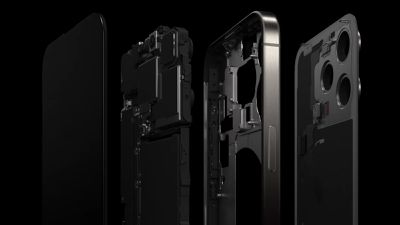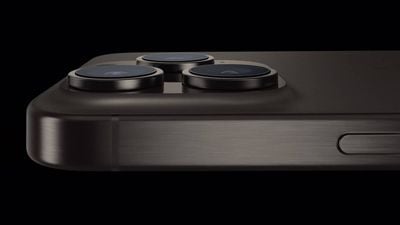
iPhone 15 Pro Discontinued
Apple discontinued the iPhone 15 Pro and Pro Max in September 2024 following the introduction of the iPhone 16 lineup. With the launch of the new iPhones, Apple removed the previous-generation Pro models from sale, while the standard iPhone 15 and iPhone 14 models slid down the pricing tiers as cheaper options. While Apple is no longer offering the iPhone 15 Pro for sale, it may still be available from third-party vendors. The roundup below is no longer being updated.
2023 iPhone 15 Pro and 15 Pro Max
Contents
- iPhone 15 Pro Discontinued
- 2023 iPhone 15 Pro and 15 Pro Max
- How to Buy
- Reviews
- Issues
- Design
- Display
- A17 Pro
- USB-C Port
- Action Button
- TrueDepth Camera and Face ID
- Triple-Lens Rear Camera
- Battery Life
- 5G Connectivity
- Emergency SOS via Satellite
- Crash Detection
- Bluetooth, Wi-Fi, NFC, GPS, and Ultra Wideband
- MagSafe
- iPhone 15 and 15 Plus
- Beyond the iPhone 15 Pro
- iPhone 15 Pro Changelog
- iPhone 15 Pro Timeline
Apple in September 2023 introduced the iPhone 15 Pro and iPhone 15 Pro Max, its new high-end flagship smartphones that are being sold alongside the iPhone 15 and iPhone 15 Plus. The iPhone 15 Pro models have an expanded feature set not available in the standard iPhone 15 devices, including more advanced camera technology, a better display, a faster A17 chip, and more.
Available in the same 6.1- and 6.7-inch sizes as the iPhone 14 Pro models, the iPhone 15 Pro models have a similar design, but there are some notable changes. Rather than stainless steel, Apple is using a frame made out of a new titanium alloy that's also used for spacecraft, and there are new titanium colors including white, black, natural, and blue. Titanium is lighter than stainless steel so the iPhone 15 Pro models weigh less than the iPhone 14 Pro models.
The titanium has a new matte, brush texture and it is accompanied by an aluminum internal frame that improves thermal dissipation and the repairability of the back glass. Apple also tweaked the design, so the frame has more contoured edges and the display bezels are much thinner. The front of the iPhone continues to be protected by Apple's Ceramic Shield material, which it says is the toughest glass used in a smartphone.
Apple is using the same Super Retina XDR Display from last year with Always-On display technology and a 120Hz ProMotion refresh rate. The iPhone 15 Pro Max features a resolution of 2796x1290, while the iPhone 15 Pro has a resolution of 2556x1179. Aside from the slimmed down bezels, there are no display changes, and it also features the same Dynamic Island at the top.
Rather than a Lightning port, the iPhone 15 Pro models have a USB-C port that offers USB 3 transfer speeds up to 10Gb/s. Charging is now done with a USB-C cable, so you can use the same cord for charging the iPhone, iPad, and Mac. With the USB-C port, an iPhone can be used to charge AirPods or an Apple Watch directly. 15W MagSafe charging continues to be available, and Apple added support for Qi2 wireless charging.
There's a customizable Action button that's modeled after the Action button on the Apple Watch Ultra, and it replaces the mute switch. It can be set to one of multiple functions, such as launching the camera, turning on Flashlight, recording a Voice Memo, or activating a Shortcut. The Action button ties in with the Dynamic Island for visual feedback that accompanies haptic feedback.
An upgraded 48-megapixel Main camera offers improved low-light performance and a new 24-megapixel default image resolution that offers high-quality images at a practical file size, an improvement over the prior 12-megapixel default. The Main camera can be adjusted to different focal lengths, including 24mm, 28mm, and 35mm, and there's an option to capture 48-megapixel HEIF images that take up less space than RAW images.
Portrait photos are now captured automatically whenever a person or pet is in the frame or you tap to focus, so you can adjust depth and focal point after capturing an image even if you don't select portrait mode. Images include sharper detail, more vivid colors, and better low-light performance. Night mode is sharper than before and Smart HDR 5 captures subjects and backgrounds with more true-to-life skin tones and brighter highlights, richer midtones, and deeper shadows when viewed in the Photos app.
There's a new Ultra Wide camera that lets in more light. The iPhone 15 Pro has a standard 3x Telephoto lens, but the iPhone 15 Pro Max is equipped with an upgraded 5x Telephoto lens that uses a new tetraprism design. Apple introduced a new optical image stabilization system that includes an autofocus 3D sensor-shift module for clearer photos.
The A17 Pro chip is Apple's first 3-nanometer chip, built on an updated node. Apple says that it includes the biggest GPU redesign in Apple history, and GPU performance is up to 20% faster than the A16. CPU performance is up to 10% faster. The new Neural Engine is up to 2x faster.
With the 6-core GPU, Apple was able to add hardware-accelerated ray tracing that allows the iPhone to run console games like Assassin's Creed Mirage and Resident Evil 4 for the first time, plus it enhances augmented reality apps. There is a dedicated AV1 decoder for more efficient video streaming. The A17 Pro powers a feature that allows the iPhone to be connected to external storage for recording 4K 60fps ProRes video right to the storage device. To accompany this feature, Apple has added an option for Log encoding, making the iPhone 15 Pro models the first smartphones to support the Academy Color Encoding System used by filmmakers.
Later in the year, the iPhone 15 Pro models will be able to record 3D spatial video that can be viewed on the Apple Vision Pro when it launches next year.

Apple added a second-generation Ultra Wideband chip that allows two iPhones with the chip to connect at a 3x longer range. The improved connectivity powers a new Precision Finding for Find My friends feature that lets you locate your friends in crowded areas with Precision Finding. Wi-Fi 6E support is included for up to 2x faster Wi-Fi speeds and access to 6GHz bands when paired with a Wi-Fi 6E router. Thread support has been added as well, for future integrations in the Home app.
Emergency SOS via satellite is being expanded to include Emergency Roadside Assistance via satellite, so if you have a car issue in an area without cellular or Wi-Fi signal, you can use satellite services to contact AAA, Apple's partner for the endeavor in the U.S.
Note: See an error in this roundup or want to offer feedback? Send us an email here.
How to Buy
iPhone 15 Pro pricing starts at $999 for the base model with 128GB of storage, while the iPhone 15 Pro Max has a starting price of $1,199 for 256GB of storage. If you need more storage space, there are options to upgrade to higher storage capacities at an additional cost.
The iPhone 15 Pro and iPhone 15 Pro Max are available for purchase from the online Apple Store, Apple retail stores, carriers, and other authorized third-party retailers. Apple introduced the iPhone 15 Pro models at its media event on September 12 with pre-orders beginning on September 15 and availability starting on September 22.
Reviews
Reviews of the iPhone 15 Pro were generally positive. While there weren't major design changes, Apple refined a number of features that make the iPhone 15 Pro a worthwhile update, especially if you have anything older than an iPhone 14 Pro.
The switch to USB-C will require getting rid of years worth of Lightning cables, but reviewers felt that the transition was worth it for the convenience of being able to charge an iPhone, iPad, and Mac with the same cable.
Apple replaced the mute switch with an Action Button, but some reviewers struggled to find a good use for it. The camera wasn't more convenient, for example, but it can be customized and changed until a useful function is found.
Reviewers were pleased with the titanium frame, and even though the iPhone 15 Pro is only nine percent lighter than the 14 Pro, it feels even lighter than that because of the different weight distribution. While Apple didn't announce battery changes, some battery tests found that the iPhone 15 Pro lasted longer than the 14 Pro.
The camera was described as the best camera Apple has come out with to date, particularly in the case of the iPhone 15 Pro Max's 5x zoom. For more on what reviewers thought of the iPhone 15 Pro models, we have a dedicated review roundup.
Issues
Some iPhone 15 Pro owners have complained about heat issues, with the iPhone overheating during benchmarks that stress the CPU and GPU. Other iPhone 15 Pro users have seen heat problems during the device's initial setup and when talking on the phone.
Apple said that there was a bug in iOS 17 that was causing the problem, along with issues in some apps like Instagram and Uber. Apple addressed the i0S 17 issue in iOS 17.0.3, and has worked with app developers to fix the app problem.
Some users have run into issues with power banks and CarPlay due to incompatibilities with the USB-C port. Apple will likely address these problems in an upcoming software update.
iPhone 15 owners who have a BMW might want to avoid using the in-car wireless charger, as there have been reports that it can damage the NFC chip in the iPhone. Several BMW owners have complained that their iPhone 15's NFC chip has become non-functional after using the charging pad, but Apple and BMW have not yet acknowledged the issue.
Design
The 6.1-inch iPhone 15 Pro and 6.7-inch iPhone 15 Pro Max (measured diagonally at the display) have the same general design as the iPhone 14 Pro and iPhone 14 Pro Max, but with more contoured edges that change the feel of the devices in the hand and lend a more modern design.

Rather than stainless steel, the iPhone 15 Pro models have titanium bands that encompass the glass front and back. Titanium is lighter weight than stainless steel, so the new models are much less heavy, and the material is also resistant to scratches and dings.
The titanium bands are bonded with an internal aluminum frame for strength and durability, with the titanium finish offering a brushed, matte look that sets the new iPhone 15 Pro models apart from the prior-generation devices. According to Apple, the finish is obtained using precision machining, sanding, brushing, and blasting. The titanium iPhone models are available in four colors: white, black, natural, and blue.

Aside from weight, the dimensions of the iPhone 15 Pro models are similar to the iPhone 14 Pro models, though they are thicker. The iPhone 15 Pro measures in at 5.77 inches (146.6 mm) tall, 2.78 inches (70.6 mm) wide, and 0.32 inches (8.25 mm) thick, while the iPhone 15 Pro Max measures in at 6.29 inches (159.9 mm) tall, 3.02 inches (76.7 mm) wide, and 0.32 inches (8.25mm) thick. The iPhone 15 Pro weighs 6.60 ounces (187 grams), while the iPhone 15 Pro Max weighs 7.81 ounces (221 grams). Both models are just a bit heavier than the their respective iPhone 15 and iPhone 15 Plus counterparts, and are lighter than the prior-generation Pro models.
The iPhone 15 Pro models feature an all-glass front protected by Apple's durable Ceramic Shield material, which the company says is stronger than other smartphone glass.
There continues to be a pill-shaped Dynamic Island at the top of the display, housing the TrueDepth camera equipment. The display bezels have been notably slimmed down this year for more available screen space.

A set of antenna bands is located at the top and sides of the phone, and there is a power button on the right side and volume buttons and an Action button on the left. Exclusive to the iPhone 15 Pro models, the Action button can be set to do everything from turning on the camera to activating a shortcut, and it is customizable.
Underneath the power button, there's a 5G mmWave antenna, but this is limited to iPhone 15 models sold in the United States. Speaker holes and a microphone are located on the bottom of the iPhone 15 Pro models, along with another major design change - a USB-C port. The USB-C port replaces the Lightning port as Apple has swapped to USB-C charging technology. In some countries, there is a SIM slot on the left side of the iPhone, but the physical SIM has been eliminated in the U.S.

The camera bump at the back of the iPhone is largely unchanged, and it features a triple-lens setup for the Wide, Ultra Wide, and Telephoto cameras along with a True Tone flash, LiDAR Scanner, and microphone.
Water and Dust Resistance
The iPhone 15 Pro and 15 Pro Max have an IP68 rating for resistance to water and dust intrusion. The smartphones are able to withstand a depth of up to six meters (19.7 feet) for up to 30 minutes.
In the IP68 number, the 6 refers to dust resistance (and means the iPhone 15 Pro can hold up to dirt, dust, and other particulates), while the 8 pertains to water resistance. IP6x is the highest dust resistance rating that exists. With the IP68 rating, the iPhone 15 Pro can withstand splashes, rain, and accidental water exposure, but intentional water exposure should be avoided.
Water and dust resistance are not permanent conditions, according to Apple, and can deteriorate over time as a result of normal wear. Apple's standard warranty does not cover liquid damage, which means it's best to use caution when it comes to liquid exposure.
Display
Compared to last year's iPhone models, the iPhone 15 Pro and iPhone 15 Pro Max have the same OLED Super Retina XDR display with the same specifications including 1000 nits max brightness, 1600 nits peak HDR brightness, and 2000 nits peak outdoor brightness.
The iPhone 15 Pro has a resolution of 2556 by 1179 with 460 pixels per inch, while the iPhone 15 Pro Max has a resolution of 2796 by 1290 with 460 pixels per inch.
There is a 2,000,000:1 contrast ratio, wide color support offers vivid, true-to-life colors, and True Tone matches the white balance of the display to the ambient lighting for a paper-like viewing experience that's easier on the eyes. There's also a fingerprint-resistant oleophobic coating and support for Haptic Touch, which provides haptic feedback when interacting with the display.
The display continues to be protected by a "Ceramic Shield" material that is made by infusing nano-ceramic crystals into glass. The ceramic crystals were manipulated to optimize for clarity while maintaining toughness, with the display created in partnership with Corning. According to Apple, Ceramic Shield is the toughest smartphone glass, with a dual-ion exchange process ensuring protection against scratches and everyday wear and tear.
Dynamic Island
The iPhone 15 Pro models continue to use the Dynamic Island, which houses the TrueDepth camera sensor for Face ID and the front-facing camera. The proximity sensor for the setup is now under the display, and smaller cutouts are used for the camera, dot protector, and other components.

The display has a small circular cutout on the right side that's for the camera, and a pill-shaped cutout on the left side for the TrueDepth system for Face ID. Apple is using software to combine these two cutouts into one pill-shaped cutout that makes up the Dynamic Island.
Apple has turned the Dynamic Island into part of the iPhone's interface, and it is used as a front-and-center information hub for notifications and other at-a-glance information from apps and services. When you make an Apple Pay payment, for example, Dynamic Island expands into a square shape to confirm your Face ID scan, and when on a phone call, it expands so you have phone controls at your fingertips.
It can display everything from Maps directions to timers to Apple Music and the AirPods connection status. It integrates with Live Activities for tracking sports scores, Uber rides, and more right from the top of the iPhone's display without leaving the app you're in, plus it can collapse down or open up when tapped.
Pro Motion
The iPhone 15 Pro models support ProMotion technology with adaptive refresh rates that range from 1Hz to 120Hz.
The refresh rate of the display changes based on what's on the screen. So if you're reading a website that's static, the iPhone will use a lower refresh rate, but if you're playing a game, watching a movie, or scrolling through content, you'll see higher 120Hz refresh rates that provide a smoother and more responsive experience.
Always-On Display
Like the iPhone 14 Pro models, the iPhone 15 Pro models include an Always-On display. With the Always-On display, the time and widgets stay active on the Lock Screen, while the wallpaper is darkened to give it a subtle look. The status bar, flashlight, and camera buttons are hidden when the display is not active.

When the iPhone is in a pocket or face down, the screen does turn off completely to preserve battery life.
A17 Pro
The iPhone 15 Pro models are equipped with the A17 Pro chip, which is Apple's first chip built on the new 3-nanometer process. The A17 Pro includes a 6-core CPU with two high-performance cores and four efficiency cores, along with a 6-core GPU.

The GPU is 20 percent faster than the GPU in the A16 Bionic, and the CPU is 10 percent faster. The 16-core Neural Engine is up to 2x faster, performing nearly 35 trillion operations per second.
According to Apple, the A17 Pro features the biggest redesign in the history of Apple GPUs. It includes hardware-accelerated ray tracing for gaming purposes, offering more fluid graphics and true-to-life lighting. Hardware-accelerated ray tracing is up to four times faster than software-based ray tracing, and with MetalFX upscaling, the GPU and Neural Engine are able to produce high-resolution graphics without a huge amount of power draw.
The iPhone 15 Pro is the first iPhone that is capable of playing console-quality games like Resident Evil 4 and Death Stranding.
Geekbench benchmark results have confirmed that the A17 Pro offers notably faster performance than the prior-generation A16 Bionic, earning a single-core score of 2,908 and a multi-core score of 7,238.
RAM
There is 8GB RAM in the iPhone 15 Pro and 15 Pro Max, up 2GB from the iPhone 14 Pro models.
Storage Space
The iPhone 15 Pro starts with 128GB of storage space, while the iPhone 15 Pro Max starts with 256GB of storage space. Both models are available with as much as 1TB of storage space.
USB-C Port
The iPhone 15 and iPhone 15 Pro models are the first to feature a USB-C port instead of a Lightning port, allowing them to be charged with a USB-C cable. With this change, the same cord can be used for charging the iPhone, iPad, Mac, and AirPods Pro 2 with USB-C charging case.

USB-C allows an iPhone to directly charge AirPods or an Apple Watch using a USB-C cable, and the iPhone is able to provide up to 4.5W. It's even possible to charge another iPhone with the iPhone 15 Pro models, though charging speeds are slow.
On the iPhone 15 Pro and iPhone 15 Pro Max, the USB-C port supports USB 3 for transfer speeds of up to 10Gb/s. Note that to get these transfer speeds, an appropriate USB-C cable is required. The cable that comes with the devices is limited to USB 2 speeds.
Action Button
The Action button on the iPhone 15 Pro and iPhone 15 Pro Max replaces the Ring/Silent switch above the volume buttons on the left side. Apple designed the Action button to be customizable, and it can be set to perform one of several different actions in the Settings app.

- Focus: Activate or deactivate a Focus mode (Do Not Disturb is the default).
- Camera: Take a photo (the default), a selfie, video, portrait, or portrait selfie.
- Flashlight: Turn the flashlight on or off.
- Voice Memos: Start or stop recording a voice memo with the Voice Memos app.
- Magnifier: Activate the Magnifier app to use the iPhone's camera as a magnifying glass to zoom in on small text or objects.
- Shortcuts: Open your favorite app, or run a shortcut created in or downloaded from the Shortcuts app, such as sending a message, playing a playlist, or controlling smart home devices.
- Accessibility: Access to various Vision settings (Classic Invert, Color Filters, Detection Mode, Increase Contrast, Reduce Motion, Reduce Transparency, Reduce White Point, Smart Invert, VoiceOver, Zoom) Motor settings (Switch Control, Voice Control, Full Keyboard Access, AssistiveTouch, Apple Watch Mirroring, Control Nearby Devices) Hearing settings (Background Sounds, Left/Right Balance, Live Captions) and General settings (Guided Access, Live Speech).
- Silent Mode: Like the Ring/Silent switch on existing iPhone models, toggle silent mode on or off, which will mute or unmute the ringer and alerts.
- Translate: Later this year, there will be a Translate action that will launch the Translate app and start a text or conversation translation.
- No Action.
Activating the Action button is done with a long press, which limits it from being hit accidentally.
TrueDepth Camera and Face ID
The iPhone 15 Pro models continue to use Face ID, Apple's facial recognition system that's built into the Dynamic Island.
Face ID is used across iOS for unlocking the iPhone, allowing access to third-party passcode-protected apps, confirming app purchases, authenticating Apple Pay payments, and more.
Face ID works through a set of sensors and cameras. A Dot Projector projects tens of thousands of invisible infrared dots onto the surface of the skin to create a 3D facial scan that maps the curves and planes of each face, with the scan read by an infrared camera.
The facial depth map is relayed to the A17 chip where it is transformed into a mathematical model that the iPhone uses to authenticate identity. Face ID works in low light and in the dark, and with hats, beards, glasses, sunglasses, scarves, masks, and other accessories that partially obscure the face.
Front-Facing Camera
The iPhone 15 Pro models include the same 12-megapixel front-facing camera with an ƒ/1.9 aperture that was available in the iPhone 14 Pro lineup. The front-facing camera has a built-in Retina Flash, and it supports almost all of the same features available in the rear cameras.
Apple has included selfie Night mode, improved Smart HDR 5 integration, Dolby Vision HDR recording, Deep Fusion to bring out fine details, a Photonic Engine that improves low-light performance, and next-generation Portrait mode that lets you take images and turn them into portrait shots later.
4K video recording, QuickTake video, slo-mo video, Portrait mode, Portrait Lighting, and the Photographic Styles feature for selectively applying edits are also supported on the front-facing camera.
Triple-Lens Rear Camera
The iPhone 15 Pro models use the same 48-megapixel Main camera that was introduced with the iPhone 14 Pro, but with the A17 Pro chip, there are new capabilities. The camera features a 24mm focal length with an ƒ/1.78 aperture and second-generation sensor-shift optical image stabilization for less movement and crisper photos and videos.
This year, the lens supports 24-megapixel and 48-megapixel high-resolution photos through the Photonic Engine, rather than 12-megapixel and 48-megapixel. Apple says that the new 24-megapixel setting offers ultra high-resolution at a reasonable file size, and both the 24-megapixel and 48-megapixel photos can be saved in a standard HEIF image file format and are not limited to RAW.

Using computational photography, the Main camera can be set to 24mm, 28mm, and 35mm focal lengths to better mirror what's possible with DSLRs. These different focal lengths can be tapped when taking a photo and are reflected as different zoom levels. Apple says that the triple-lens camera and the different Main camera options are the equivalent of having seven lenses in your pocket.
Apple is using the same Ultra Wide camera with an ƒ/2.2 aperture, and this lens is also used for macro shots. The third Telephoto lens is what sets the Pro models apart from the standard iPhone 15 models.
The iPhone 15 Pro has a 12-megapixel Telephoto camera that offers 3x zoom, but the iPhone 15 Pro Max is using an upgraded Telephoto system that allows for 5x zoom. The iPhone 15 Pro Max has a folded glass structure below the lens, which Apple refers to as tetraprism technology. It reflects light four times over, allowing for a longer focal length of 120mm.
Apple is using 3D sensor-shift optical image stabilization for the Telephoto lens in the Pro Max, and because it is able to move in three directions, it delivers twice as many microadjustments as before for crisp photos even when zoomed all the way in.
Video Capabilities
The iPhone 15 Pro and Pro Max offer up to 4K video recording at 24, 25, 30, or 60 frames per second. HDR recording, ProRes video, Cinematic mode, Action mode, slo-mo video, and time-lapse are all supported.
Portrait Mode Update
Apple overhauled Portrait mode with the iPhone 15 lineup, and there is no longer a need to specifically choose Portrait mode before capturing an image.
You can now snap a photo and if there is a person or pet, depth information is collected and Portrait mode is enabled automatically with a blurred background effect. This also works if you tap to focus on an area in an image, and you can turn it on or off in the Photos app.
The degree of background blur can be adjusted as usual, and you can also shift the focus between objects that are in the scene in the Photos app. Apple says that Portrait images feature more detail and richer color, even in Night mode, plus Portrait images can also now be Live Photos.
Spatial Video
With iOS 17.2, Apple is adding a feature that allows iPhone 15 Pro owners to record spatial video that can be viewed on the forthcoming Apple Vision Pro headset. 3D video just shows up as standard 2D video on the iPhone and other devices, but when the headset comes out, spatial videos captured will be in 3D on the headset.

Several members of the media have been able to test the spatial video feature on the Vision Pro, and the feature has been described as so lifelike that it's almost creepy. The Wall Street Journal's Joanna Stern said that it creates intimacy that 2D photos do not, while CNET's Scott Stein said that the videos are easy to record with the iPhone 15 Pro models and look "compellingly realistic."
Other Camera Features
There are several other camera bells and whistles that Apple has been adding to the iPhones over the years.
- Smart HDR 5 - Recognizes one or more people in a scene and optimizes contrast, lighting, and even skin tones for each person so everyone looks their best. Smart HDR was been upgraded in the iPhone 15 Pro to deliver better color and more true-to-life skin tones.
- Photonic Engine - The Photonic Engine combines the best pixels from a high-resolution image and an image optimized for light capture, leading to a 24-megapixel image with detail drawn from an image twice the resolution.
- Photographic Styles - Smart, adjustable filters that can do things like boost or mute colors without affecting skin tone. Styles apply selectively to an image, unlike a filter that's applied to the entire image. Photographic Styles include Vibrant (boosts colors), Rich Contrast (darker shadows and deeper colors), Warm (accentuates golden undertones), or Cool (accentuates blue undertones). Tone and Warmth are customizable for each style, so you can get the exact look that you want.
- Night mode - Takes a series of images over a few seconds and aggregates them to allow for photography in extreme low lighting situations. Night mode scenes feature richer color and sharper detail with the iPhone 15 Pro.
- Deep Fusion - Works in mid to low lighting conditions and brings out the texture and detail in the image.
- Macro - The Ultra Wide camera activates when you are close to a subject, shifting into Macro mode.
- Portrait Lighting - Changes the lighting of Portrait mode photos with effects that include Natural, Studio, Contour, Stage, Stage Mono, and High-Key Mono.
- True Tone flash - True Tone flash is the built-in flash, and it is designed to match the ambient lighting so it doesn't throw off the white balance of the photo when used. The iPhone 15 Pro flash is brighter and it has more consistent lighting.
- Cinematic mode - A video mode that keeps the focus on the main subject that you're filming even as you move.
- Action mode - Enhances image stabilization to improve shaky handheld video.
- Panorama - Captures panoramic shots up to 63 megapixels.
- Burst mode - Allows a series of images to be captured all at once, which is good for high-action shots.
- Log encoding - Available for ProRes images, Log encoding allows for extra range and flexibility for visual effects and color grading.
- ACES support - The iPhone 15 Pro is the first smartphone that offers Academy Color Encoding System support, which is useful for pro filmmakers.
Battery Life
There is a 3,274 mAh battery in the iPhone 15 Pro, while the iPhone 15 Pro Max has a 4,422 mAh battery, both just a bit higher-capacity than the batteries from the respective prior-generation models. The iPhone 15 Pro offers up to 23 hours of battery life for video playback, up to 20 hours for streaming video playback, and up to 75 hours for audio playback.
The iPhone 15 Pro Max offers up to 29 hours of video playback, up to 25 hours of streaming video playback, and up to 95 hours of audio playback. All iPhone 15 models are fast-charge capable and can charge up to 50 percent in 30 to 35 minutes with a 20W or higher power adapter.
iPhone 15 models show the battery cycle count for the first time, and there is also a built-in setting to prevent an iPhone from charging past 80 percent to preserve battery health.
5G Connectivity
The iPhone 15 Pro models are equipped with a next-generation Qualcomm Snapdragon X70 modem that supports 5G connectivity. Qualcomm says that the X70 modem features the first 5G AI system in a modem system, using AI to enable faster 5G speeds, better coverage, lower latency, and improved power efficiency.
In the United States, iPhone owners can connect to both mmWave and sub-6GHz networks, while other countries are limited to sub-6GHz. mmWave 5G networks are the fastest 5G networks, but mmWave is short-range and can be obscured by buildings, trees, and other obstacles, so its use is limited to major cities and urban areas along with venues like stadiums, airports, and other places where a lot of people congregate.
Sub-6GHz 5G is more widespread and available in urban, suburban, and rural areas across the United States and other countries. For the most part, when you use a 5G network, you'll be using sub-6GHz 5G. Sub-6GHz 5G is typically faster than LTE, especially when mid-band spectrum is used, but it isn't always the blazing fast 5G that you expect.
5G tests have suggested that the iPhone 15 Pro and iPhone 15 Pro Max support 5G download speeds that are up to 27 percent faster than the download speeds available on the iPhone 14.
5G Bands
The iPhone 15 Pro models in the United States support more than 20 5G bands. The following bands are supported:
- Sub-6GHz 5G - 5G NR (Bands n1, n2, n3, n5, n7, n8, n12, n14, n20, n25, n26, n28, n29, n30, n38, n40, n41, n48, n53, n66, n70, n71, n77, n78, n79)
- mmWave 5G - Bands n258, n260, n261
LTE Bands
The iPhone 15 Pro models continue to offer Gigabit LTE with 4x4 MIMO for connecting to LTE networks when 5G is unavailable. The following bands are supported:
- FDD-LTE - Bands 1, 2, 3, 4, 5, 7, 8, 12, 13, 14, 17, 18, 19, 20, 25, 26, 28, 29, 30, 32, 66, 71
- TD-LTE - Bands 34, 38, 39, 40, 41, 42, 46, 48, 53
Emergency SOS via Satellite
All iPhone 15 models can connect to satellites in emergency situations when cellular and Wi-Fi connections are not available. Apple has designed the new Emergency SOS via satellite feature to allow the iPhone's antennas to connect to satellites operated by Globalstar.

Satellite communications are available in emergency situations where you can't connect to Wi-Fi or a cellular tower, and the feature is designed to be used in open spaces with few trees so the iPhone can connect to a satellite that's in the sky.
Apple has a walkthrough interface that instructs you how to hold the iPhone to connect to a satellite, and the company has developed a compressed messaging protocol because sending data via satellite can take minutes. In an area with no trees, a short message to emergency services can send in as little as 15 seconds.
Emergency SOS via satellite provides a series of important questions that you answer when it is activated, with these questions aimed at getting necessary details to emergency personnel as quickly as possible. The answers that you provide are sent directly to emergency services if text communication is supported in your area, or sent to relay centers staffed by Apple-trained specialists who can call emergency services on the user's behalf.
Satellite connectivity is mainly designed to allow users to contact emergency services in dire situations, but it can also be used to update your Find My location if you're camping or hiking off the grid, giving your family and friends peace of mind about where you are.
- How to Demo or Use the Emergency SOS via Satellite Service
- How to Share Your Location via Satellite With Find My
Emergency SOS via satellite is free for all iPhone 15 users for two years, and Apple has not yet provided details on what it will cost in the future.
Apple with the iPhone 15 models also added Roadside Assistance via satellite, which allows U.S. iPhone users to contact AAA for help if they have car trouble in an area without cellular or Wi-Fi connectivity. There is no charge for the satellite usage with Roadside Assistance, but a AAA membership or one-time fee for the AAA help is required.
Crash Detection
There's a high dynamic range gyroscope and a dual-core accelerometer capable of detecting G-force measurements of up to 256Gs in the iPhone 15 models, and paired with other iPhone sensors like a barometer that can detect cabin pressure changes caused by deployed airbags, this hardware enables a Crash Detection feature.

The iPhone 15 models can detect a severe car crash and automatically dial emergency services when the car's occupants are seriously injured or unable to reach their phones. The GPS in the iPhone is able to detect speed changes, and the microphone is able to recognize loud sounds associated with severe car crashes. Crash Detection is also available on the Apple Watch, and the iPhone and Apple Watch work together to contact emergency services when an accident occurs.
Bluetooth, Wi-Fi, NFC, GPS, and Ultra Wideband
The iPhone 15 Pro and 15 Pro Max support Wi-Fi 6E (802.11ax) with 4x4 MIMO, and Bluetooth 5.3. Wi-Fi 6E is faster than the Wi-Fi 6 used in the iPhone 14 Pro models, and it allows the iPhone 15 Pro and Pro Max to connect to the 6GHz Wi-Fi network broadcast by Wi-Fi 6E routers.
There's an NFC chip with reader mode, and a second-generation Ultra Wideband chip. The new Ultra Wideband chip provides improved spatial awareness, allowing iPhone 15 Pro models to more precisely locate other Apple devices with an Ultra Wideband chip. The chip allows two iPhones to connect to each other at three times the range as before.
The Ultra Wideband chip can be used for precision tracking, such as when locating AirTags. It is also used for directional AirDrop and for interactions with the HomePod mini, plus Apple has added a Precision Finding feature for locating friends with an iPhone 15 in a crowded area.
As for GPS, the iPhone 15 Pro models support GPS, GLONASS, Galileo, QZSS, and BeiDou location services.
MagSafe
There continue to be MagSafe magnets at the back of the iPhone 15 models, with those magnets able to connect to the MagSafe charger and other magnetic accessories. Official MagSafe chargers from Apple and authorized third parties can wirelessly charge the iPhone 15 models at up to 15W.

Second-generation Qi-based charging is also available, but it still maxes out at 7.5W and does not support faster charging.
iPhone 15 and 15 Plus
Apple is selling the iPhone 15 Pro and 15 Pro Max alongside the more affordable iPhone 15 and iPhone 15 Plus devices.
Compared to the iPhone 15 Pro models, the iPhone 15 and 15 Plus have an aluminum frame rather than titanium, thicker bezels, the prior-generation A16 Bionic chip, no ProMotion or Always-On display, and no zoom lens. They share the same USB-C port (though the iPhone 15 models have slower USB 2 transfer speeds), 5G connectivity, and Dynamic Island.
More information about the iPhone 15 and iPhone 15 Plus can be found in our roundup.
Beyond the iPhone 15 Pro
The 2024 iPhone 16 lineup could see an update to the "Pro" iPhone display sizes, with the smaller iPhone 16 Pro adopting a 6.3-inch display and the larger Pro Max adopting a 6.9-inch display. There have also been rumors of an even higher-end "Ultra" model.
Other potential additions include solid-state buttons, a faster A18 chip, Wi-Fi 7, and notable camera improvements.
More information on what's coming to next year can be found in our dedicated iPhone 16 roundup.
iPhone 15 Pro Changelog
- April 15 - Updated buyer's guide and added new video.
- February 21 - Added iPhone 16 Pro comparison guide.
- January 18 - Updated buyer's guide information.
- December 22 - Refreshed video.
- November 15 - Added 5G speed updates.
- November 13 - Added details on spatial video recording in iOS 17.2.
- October 24 - Updated buyer's guide information.
- October 11 - Added a guide on maximizing iPhone 15 battery life.
- October 4 - Updated issues section with iOS 17.0.3 release and info about BMW wireless chargers.
- September 29 - Added issues section with details on overheating and problems with CarPlay and power banks, plus swapped in new video.
- September 25 - Added info on Qualcomm X70 modem confirmed in teardown.
- September 22 - Launch day! iPhone 15 Pro roundup overhauled with all new info.
- September 15 - Pre-orders are now live.
- September 11 - New details on weight, the titanium chassis, RAM, and storage capacity.

